#giving half the credit to the feelings i had during this montage of clips to the song that's playing. good choice
Explore tagged Tumblr posts
Text
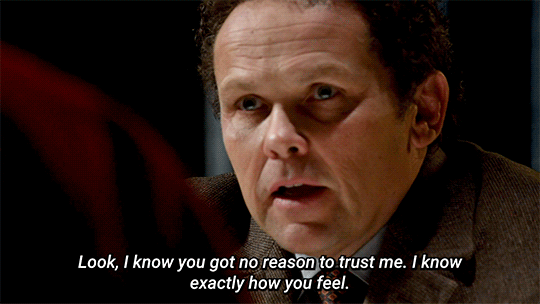
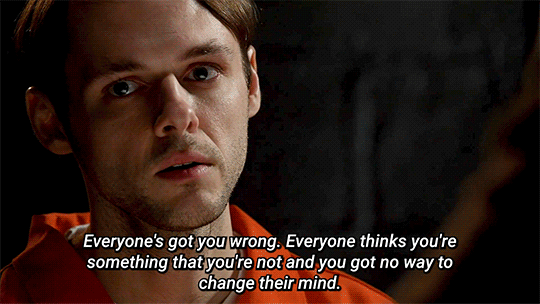


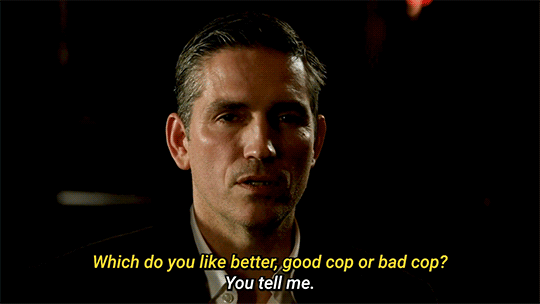
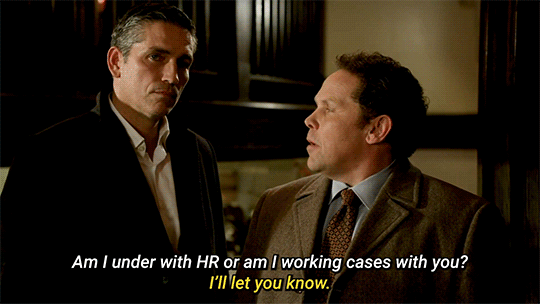
person of interest s1e18 identity crisis
Everyone's got you wrong. Everyone thinks you're something that you're not and you got no way to change their mind.
first time watch liveblogging via gifs part 19 of ?
#person of interest#poi#poi 1x18#john reese#lionel fusco#poiedit#lbpoi#poi gifs#poigifs#mygifs#says something about the show that i care about fusco and am feeling bad for him. and worry something's gonna happen to him#feels like a character that they set up a nice redemption arc before they get axed. but i dunno if that's this show's style#as ever i'm going along without any additional information just making gifs as i watch#also kinda feel like reese is projecting on fusco here a bit. you got some feelings about being good or bad there john#giving half the credit to the feelings i had during this montage of clips to the song that's playing. good choice
76 notes
·
View notes
Text
Episode 5 aka “omfg, I love this drama”. I actually didn’t think it would take the whole episode to find Hee Seong/Hyun Soo, but the writer has continued to surprise me. I didn’t even realize how much time had passed before the episode was over. I love how smart Ji Won is. The drama is letting her use her brains. She’s not being dumbed down or being mislead to drag out the reveal of HS’s involvement. The watch is what tips her off to who she had been chasing earlier and, looking back, she realizes she recognizes that face. (“No way. I can recognize you even from your shadow.”) Of course, she struggles with this even as she conceals the evidence. She knows this is Bad, and right now, no one can find out. I feel a bit sorry for her hoobae who had no idea why she’s snapping at him. ^^;; And then he was along for the ride with JW and her tunnel vision as she tried to apprehend the taxi driver. Aside from the bizarre scene at police headquarters (though it was funny xD), I like that we got to see the detectives do their jobs, tracking down and using clues to figure out where the suspect is. I take back everything I said about the sunbae. (Please don’t die!!) We even get to see the Team Leader out in the field when he informs HS’s “parents” about what happened. But no wonder HS didn’t want JW near his “mom”. She has no chill whatsoever under pressure. HS was right, JW would see right through her. I wouldn’t be surprised if the Team Leader recalls this interaction later because she was frankly being way too obvious. Any lenient feelings I may have had for the parents has shriveled up. They are absolutely going to throw Hyun Soo under the bus. I mean, they state it explicitly. Well, the father does. The mom actually didn’t seem as sure, but that might just be me giving her the benefit of the doubt after her moment of weakness during her conversation with Hyun Soo in the pharmacy. Anyways, I don’t trust either of them, and I’m sure HS is gonna have to deal with their shit (and their real son) in the back half of the drama. I didn’t get any shady vibes from the sister previously, but I sure as hell have them now, lol. “Keep it [the goldfish charm] on you at all times”??? Did she say that to ensure he would have a piece of evidence on him linking him to the serial murders if/when he was ever caught? Where is that charm now? Is JW going to find it in the basement?! (And then burn it in that bonfire from the trailer? 👀) Despite this revelation of where the goldfish charm came from, Hyun Soo remained stubbornly quiet. He was willing to die for his sister rather than reveal what he knows. If HS had told the taxi driver, he knows Hae Soo would’ve been the next target. I hope that loyalty isn’t misplaced. While I suspect her a bit, I’m still 50/50 on if she’s evil or messed up just like her brother. But god, all of Hyun Soo’s confrontation scenes with the taxi driver. *chef’s kiss* (Give LJG all the awards.) The driver clearly wasn’t listening to him. He only wanted information that Hyun Soo could not give him. I wonder if he actually believed him at the very end when HS denied it yet again. The more we learn about HS and JW in the past, the more I love them. JW mentioned possible robbers because of the blackout, and I didn’t think HS got the message from his reaction. But he stays outside the store until the electricity comes back on (╥﹏╥)♥ There was absolutely no reason for him to do that if he didn’t care on some level, and at this point, they’re just barely acquaintances too. And then their conversation in 2008… they were both honest and straightforward with each other. (Well, HS was as honest as he could be without divulging the darkest of his secrets.) HS had been trying to drive her away for her own good, and he told her point-blank about what’s wrong with him/why he isn’t suitable as a potential partner. But JW is undeterred and goes on about how he has only one problem, which she has the solution to. She sees something in him that he doesn’t, but she will love him, she will be there for him, she’ll teach him whatever he needs to know… and then things will change. And they did. Ji Won took the time to see him, and Hyun Soo works on himself, betters himself, for her. They manage to carve out a happy, peaceful life for themselves. But the drowning scene! God, it didn’t disappoint. I’m trash for when my OTPs are in life or death situations, and one half is desperate and frantic with worry over the other. JW has figuratively and now literally breathed life into HS (╥﹏╥) JW didn’t have time to fully process HS’s presence in his hometown since she got sidetracked and found out he was kidnapped. In the next episode, she’ll definitely start to put clues together. If she doesn’t figure out his identity right away, she’ll be set on that path. HS will also be in the hospital recovering, so she has time to snoop and come to her own conclusions without him running interference. It will be so interesting if JW figures it out, but she doesn’t say anything or confront him right away. So he doesn’t know that she knows, and he’ll continue acting “normal” and give his excuses about why he was at the inn, etc. Meanwhile, JW is uncovering the full truth and perhaps misunderstanding a few things along the way. The ending montage had me so confused, lol. I initially thought they were part of HS’s memories but then they dropped the future parts too. Plus we also have JW wandering around on her own, so that’s another mark against it being his memories. Instead of the normal ending credits, they decided to give us this sneak peek, probably partially as promo for the new OST. Like a mini MV clip. I think it also might be because everything will change in the next episode, but I guess we’ll see. There’s also so much going on in that montage, I don’t even know where to start. Is their relationship doomed? (╥﹏╥) That’s the vibe I was getting, especially from those angsty parts where they’re both emotional and he has dried blood on his face and she’s crying. Then it looks like he leaves her, and I’m assuming she told him to go… Don’t mess with my heart like this!1!! My Twitter liveblog for Ep5: twitter.com/krysyuy/status/1293643015672619008
#flower of evil#foe: text#character: cha ji won#character: baek hee seong | do hyun soo#ship: hee seong x ji won#character: do hae soo#character: baek man woo#character: kong mi ja#foe: commentary#foeep:05#krysyuy ♥s kdramas
29 notes
·
View notes
Link
...The candidates were talking about health care. At first, Biden sounded strong, confident, presidential: “My plan makes a limit of co-pay to be One. Thousand. Dollars. Because we—”
He stopped. He pinched his eyes closed. He lifted his hands and thrust them forward, as if trying to pull the missing sound from his mouth. “We f-f-f-f-further support—” He opened his eyes. “The uh-uh-uh-uh—” His chin dipped toward his chest. “The-uh, the ability to buy into the Obamacare plan.” Biden also stumbled when trying to say immune system.
Fox News edited these moments into a mini montage. Stifling laughter, the host Steve Hilton narrated: “As the right words struggled to make that perilous journey from Joe Biden’s brain to Joe Biden’s mouth, half the time he just seemed to give up with this somewhat tragic and limp admission of defeat.”
Several days later, Biden’s team got back in touch with me. One of his aides gingerly asked whether I’d noticed the former vice president stutter during the debate. Of course I had—I stutter, far worse than Biden. The aide said he was ready to talk about it. In November, after Biden stumbled multiple times during a debate in Atlanta, the topic would become even more relevant.
...Stuttering is a neurological disorder that affects roughly 70 million people, about 3 million of whom live in the United States. It has a strong genetic component: Two-thirds of stutterers have a family member who actively stutters or used to. Biden’s uncle on his mother’s side—“Uncle Boo-Boo,” as he was called—stuttered his whole life.
In the most basic sense, a stutter is a repetition, prolongation, or block in producing a sound. It typically presents between the ages of 2 and 4, in up to twice as many boys as girls, who also have a higher recovery rate. During the developmental years, some children’s stutter will disappear completely without intervention or with speech therapy. The longer someone stutters, however, the lower the chances of a full recovery—perhaps due to the decreasing plasticity of the brain. Research suggests that no more than a quarter of people who still stutter at 10 will completely rid themselves of the affliction as adults.
The cultural perception of stutterers is that they’re fearful, anxious people, or simply dumb, and that stuttering is the result. But it doesn’t work like that. Let’s say you’re in fourth grade and you have to stand up and recite state capitals. You know that Juneau is the capital of Alaska, but you also know that you almost always block on the j sound. You become intensely anxious not because you don’t know the answer, but because you do know the answer, and you know you’re going to stutter on it.
Stuttering can feel like a series of betrayals. Your body betrays you when it refuses to work in concert with your brain to produce smooth speech. Your brain betrays you when it fails to recall the solutions you practiced after school with a speech therapist, allegedly in private, later learning that your mom was on the other side of a mirror, watching in the dark like a detective. If you’re a lucky stutterer, you have friends and family who build you back up, but sometimes your protectors betray you too.
...The students are taking turns reading a book, one by one, up and down the rows. “I could count down how many paragraphs, and I’d memorize it, because I found it easier to memorize than look at the page and read the word. I’d pretend to be reading,” Biden says. “You learned early on who the hell the bullies were,” he tells me later. “You could tell by the look, couldn’t you?”
...“The paragraph I had to read was: ‘Sir Walter Raleigh was a gentleman. He laid his cloak upon the muddy road suh-suh-so the lady wouldn’t soil her shoes when she entered the carriage,’ ” Biden tells me, slightly and unintentionally tripping up on the word so. “And I said, ‘Sir Walter Raleigh was a gentle man who—’ and then the nun said, ‘Mr. Biden, what is that word?’ And it was gentleman that she wanted me to say, not gentle man. And she said, ‘Mr. Buh-Buh-Buh-Biden, what’s that word?’ ”
...Listening back to that part of the conversation after our interview made me feel dizzy. I can only speculate as to why Biden’s campaign agreed to this interview, but I assume the reasoning went something like this: If Biden disclosed to me, a person who stutters, that he himself still actively stutters, perhaps voters would cut him some slack when it comes to verbal misfires, as well as errors that seem more related to memory and cognition.
But whenever I asked Biden about what appeared to be his present-day stuttering, the notably verbose candidate became clipped, or said he didn’t remember, or spun off to somewhere new.
I wondered if I reminded Biden of his old self, a ghost from his youth, the stutterer he used to be. He and I are about the same height. We happened to be wearing the exact same outfit that day: navy suit, white shirt, no tie. We both went to all-male prep schools, the sort of place where displaying any weakness is a liability.
As I listened to the recording of our interview, I remembered how I used to respond when people asked me about my stutter. I’d shut down. I’d try to change the subject. I’d almost always look away.
...This evolution in treatment has been accompanied by a new movement to destigmatize the disorder, similar to the drive to view autism through a lens of “neurodiversity” rather than as a pathology. The idea is to accept, even embrace, one’s stutter. There are practical reasons for this: Research shows, according to Donaher, that the simple disclosure “I stutter” benefits both the stutterer and the listener—the former gets to explain what’s happening and ease the awkward tension so the latter isn’t stuck wondering what’s “wrong” with this person. Saying those two words is harder than it seems. “I’m working with people who spend their whole lives and are never able to disclose it,” Donaher told me.
Eric S. Jackson, an assistant professor of communicative sciences and disorders at NYU, told me he believes that Biden’s eye movements—the blinks, the downward glances—are part of his ongoing efforts to manage his stutter. “As kids we figure out: Oh, if I move parts of my body not associated with the speech system, sometimes it helps me get through these blocks faster,” Jackson, a stutterer himself, explained. Jackson credits an intensive program at the American Institute for Stuttering, in Manhattan, with bringing him back from a “rock bottom” period in his mid-20s, when he says his stutter kept him from meeting women or speaking up enough to reach his professional goals. Afterward, Jackson went all in on disclosure: Every day for six months, he stood up during the subway ride to and from work and announced that he was a person who stutters. “I had this new relationship with my stuttering—I was like Hercules,” he told me. At 41, Jackson still stutters, but in conversation he confidently maintains eye contact and appears relaxed. He wishes Biden would be more transparent about his intermittent disfluency. “Running for president is essentially the biggest stage in the world. For him to come out and say ‘I still stutter and it’s fine’ would be an amazing, empowering message.”
Occasionally, Biden has used present-tense verbs when discussing his stutter. “I find myself, when I’m tired, cuh-cuh-catching myself, like that,” he said during a 2016 American Institute for Stuttering speech. Biden has used the phrase we stutterers at times, but in most public appearances and interviews, Biden talks about how he overcame his speech problem, and how he believes others can too. You can watch videos posted by his campaign in which Biden meets young stutterers and encourages them to follow his lead. They’re sweet clips, even if the underlying message—beat it or bust—is out of sync with the normalization movement.
Emma Alpern is a 32-year-old copy editor who co-leads the Brooklyn chapter of the National Stuttering Association and co-founded NYC Stutters, which puts on a day-long conference for stuttering destigmatization. Alpern told me that she’s on a group text with other stutterers who regularly discuss Biden, and that it’s been “frustrating” to watch the media portray Biden’s speech impediment as a sign of mental decline or dishonesty. “Biden allows that to happen by not naming it for what it is,” she said, though she’s not sure that his presidential candidacy would benefit if he were more forthcoming. “I think he’s dug himself into a hole of not saying that he still stutters for so long that it would strike people as a little weird.”
...As he watched The King’s Speech, Biden accurately guessed that the screenwriter, David Seidler, was a stutterer. “He showed me a copy of a speech they found in an attic that the king had actually used, where he marks his—it’s exactly what I do!” Biden tells me, his voice lifting. “My staff, when I have them put something on a prompter—I wish I had something to show you.”
He pulls out a legal pad and begins drawing diagonal lines a few inches apart, as if diagramming invisible sentences: x words, breath, y words, breath. “Because it’s just the way I have—the, the best way for me to read a, um, a speech. I mean, when I saw The King’s Speech, and the speech—I didn’t know anybody who did that!”
...A stutter does not get worse as a person ages, but trying to keep it at bay can take immense physical and mental energy. Biden talks all day to audiences both small and large. In addition to periodically stuttering or blocking on certain sounds, he appears to intentionally not stutter by switching to an alternative word—a technique called “circumlocution”—which can yield mangled syntax. I’ve been following practically everything he’s said for months now, and sometimes what is quickly characterized as a memory lapse is indeed a stutter. As Eric Jackson, the speech pathologist, pointed out to me, during a town hall in August Biden briefly blocked on Obama, before quickly subbing in my boss. The headlines after the event? “Biden Forgets Obama’s Name.” Other times when Biden fudges a detail or loses his train of thought, it seems unrelated to stuttering, like he’s just making a mistake. The kind of mistake other candidates make too, though less frequently than he does.
During his 2016 address at the American Institute for Stuttering, Biden told the room that he’d turned down an invitation to speak at a dinner organized by the group years earlier. “I was afraid if people knew I stuttered,” he said, “they would have thought something was wrong with me.”
Yet even when sharing these old, hard stories, Biden regularly characterizes stuttering as “the best thing that ever happened” to him. “Stuttering gave me an insight I don’t think I ever would have had into other people’s pain,” he says. I admire his empathy, even if I disagree with his strict adherence to a tidy redemption narrative.
In Biden’s office, as my time is about to run out, I bring up the fact that Trump crudely mocked a disabled New York Times reporter during the 2016 campaign. “So far, he’s called you ‘Sleepy Joe.’ Is ‘St-St-St-Stuttering Joe’ next?”
“I don’t think so,” Biden says, “because if you ask the polls ‘Does Biden stutter? Has he ever stuttered?,’ you’d have 80 to 95 percent of people say no.” If Trump goes there, Biden adds, “it’ll just expose him for what he is.”
I ask Biden something else we’ve been circling: whether he worries that people would pity him if they thought he still stuttered.
He scratches his chin, his fingers trembling slightly. “Well, I guess, um, it’s kind of hard to pity a vice president. It’s kind of hard to pity a senator who’s gotten six zillion awards. It’s kind of hard to pity someone who has had, you know, a decent family. I-I-I-I don’t think if, now, if someone sits and says, ‘Well, you know, the kid, when he was a stutterer, he must have been really basically stupid,’ I-I-I don’t think it’s hard to—I’ve never thought of that. I mean, there’s nobody in the last, I don’t know, 55 years, has ever said anything like that to me.”
He slips back into politician mode, safe mode, Uncle Joe mode: “I hope what they see is: Be mindful of people who are in situations where their difficulties do not define their character, their intellect. Because that’s what I tell stutterers. You can’t let it define you.” He leans across the desk. “And you haven’t.” He’s in my face now. “You can’t let it define you. You’re a really bright guy.”
He’s telling me, in essence, that my stutter doesn’t matter, which is what I want to tell him right back. But here’s the thing: Most of the time, Biden speaks smoothly, and perhaps he sincerely does not believe that he still stutters at all. Or maybe Biden is simply telling me the story he’s told himself for several decades, the one he’s memorized, the one he can comfortably express. I don’t want to hear Biden say “I still stutter” to prove some grand point; I want to hear him say it because doing so as a presidential candidate would mean that stuttering truly doesn’t matter—for him, for me, or for our 10-year-old selves...
-------
Vote for whomever you think would be the best president. There are plenty of valid reasons to prefer one candidate over another. But stop spouting off bullshit conspiracy theories while pretending to be an expert in speech pathology, stuttering, AND senility. (And realize you’re also implicitly calling everyone with a stutter or any speech disorder mentally demented or mentally deficient).
#long post#don't care#this shit is starting to really piss me off#and sounds exactly like the shit the alt-right and fox news puts out
9 notes
·
View notes
Text
The Assassin (刺客聶隱娘, 2015): the quintessence of Hou Hsiao-Hsien’s visual style
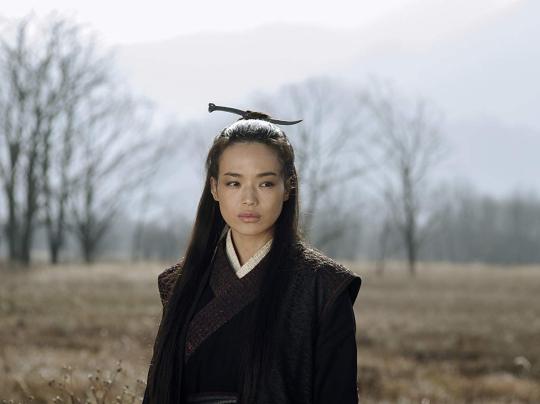
The journey of Taiwanese New Wave director and a living god of Oriental cinema Hou Hsiao-Hsien has been very long and hopefully, it is not over yet. There were many rumors on his new film starring Shu Qi, though it is not confirmed if a 72-years-old master would release it or not. Till date, his latest film is The Assassin (2015) which became another feature receiving mixed reviews in his home country Taiwan and becoming quite acclaimed in Europe. The film had brought Hou Hsiao-Hsien the award for Best Director at Cannes Film Festival, his second reward at Cannes.

According to Hou Hsian-Hsien himself, the modern audience in Taiwan has been changing a lot during the last years with the further expansion of the Internet. His films have always been not for farm obscurity in Taiwan, as the viewers there still watch Hollywood films of a different sort. Now it is even more challenging for Hou to entertain the viewers, and it seems like The Assassin was doomed to be praised only in Europe. We can't say the film is not dramatic, but it requires utmost attention towards aesthetics, patience, and full immersion into the visuality of the world created by Hou Hsian-Hsien. You can't skip anything, and The Assassin is sort of enchantment you fall under. Unfortunately, such spells might be unable to penetrate many viewers, yet it doesn't make the film of Hou less vivacious.
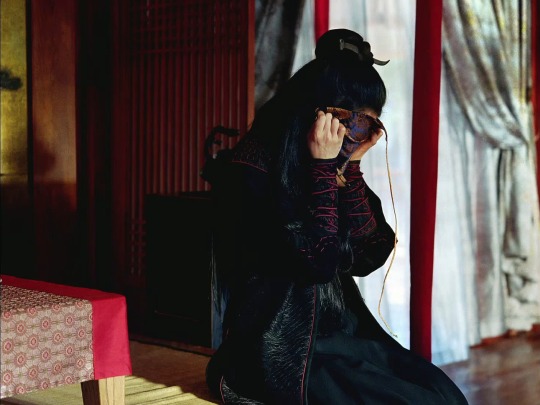
The Assassin is based on a plot revolving around the outstanding professional assassin Nie Yinniang and adapts for the screen the ninth-century Chinese story written by Pei Xing. The girl was betrayed by her family and sent to the monastery high in the hills to be brought up. From the age of ten, Yinniang was raised by nuns in exile and trained to become an assassin. She slays the victims assassinating different officials and big-wigs. Yinniang is impeccable in her skills, but her heart doesn't allow to execute some killings she considers dishonorable. In order to test Yinniang's spirit and resolve, her superior gives her the task to kill Yinniang's own cousin Tian Ji'an (portrayed by Chang Chen) who also used to be betrothed to her. She hasn't gotten over the feelings to him, as we learn later. Moreover, the family drama had deeply affected her being, and the assassins’ wounds don’t get healed with the years passing by. While encountering Tian Ji’an, she also meets his wife, concubine, father, other assassins and many other extra characters forming the story. In short words, the plot is all about Yinniang's inner fight between the resolve to follow the orders and her heart's desire to contradict them. However, the way Hou delivers the story is very mysterious and not quite clear, so many viewers might be confused. It doesn’t bother the director so much, as the plot is not a thing of drastic importance in The Assassin.
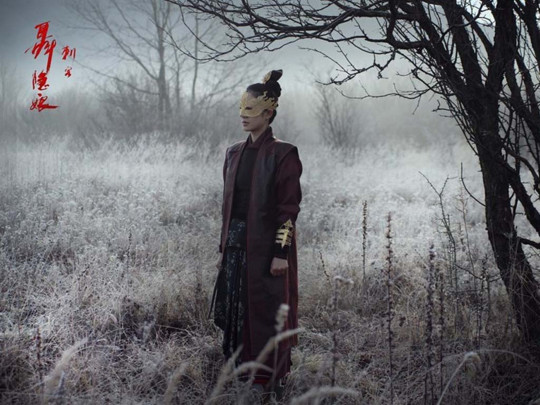
Commonly for Hou, the plot of the film is not something the viewers would be really paying attention at. Just like for example in Shanghai Flowers or A City of Sadness there is nothing much going on, in terms of action. The Assassin is de-facto a wuxia film, but there are very few instances where the characters cross their weapons. These scenes don't stand out in the beauty of combat but come up to emphasize the drama. But the real action is missing, and this is Hou's intention. The majority of viewers would try to follow this simple plot for the first 20-30 minutes and then they are to decide whether to immerse fully into the visual sophistication of The Assassin or to give it up.
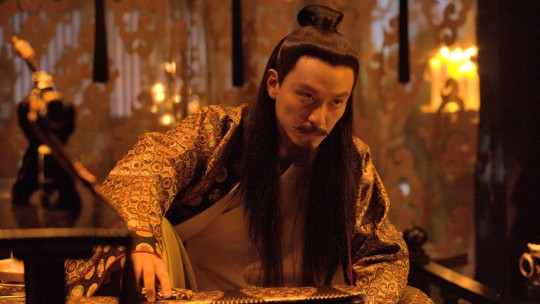
The visuality and imagery of The Assassin are on the highest peaks of Hou's style development. It's hardly unlikely you would find so many vivid and sophisticated landscapes depicted in such manner in other films. The way Hou shows them is hard to describe as these landscapers swamp your mind and immerse into the old times you can really feel and taste. This is realistic and beautiful as in the epic legend at the same time. The work on decorations is absolutely impeccable. It reminds of Shanghai Flowers very much, but this time all props are even more tense, bright and gorgeous. There are very few locations in the film, but both nature spots and buildings are made in a perfect way emphasizing the significance of every littlest thing. The design of costumes is also just classy - watching Yinniang wearing her black outfits and her hair is one-of-a-kind experience leaving you enthralled and mesmerized.

As I already mentioned, the film falls short in the narrative part, and we just need to ignore the concept of domination of the narration in the cinema. The only way to watch The Assassin is to let the stream carry you wherever it goes and to observe every detail. The pace of the film is extremely slow and hypnotic, this is the real example of Oriental arthouse where the visual delights overwhelm all other parts of the film. However, it is very different from those Asian wuxia films that became very popular in the United States. Unlike those films, The Assassin is not really moving and it doesn't give a glimpse into "bizarre Asian culture" and crazy sword fights with wild visual effects. Hou’s film would fascinate those who are already deep into Oriental romance, drama, and culture. Hou Hsiao-Hsien is not against editing, but we see that he still employes slow dramatic close-ups and long takes to avoid too much of montage. The camera work is never frenetic. Camera sashays with tremendous grace, slowly immersing the viewers into the boundless of The Assassin. It feels like the time had stopped, as Hou's camera reveal this adorable dream.
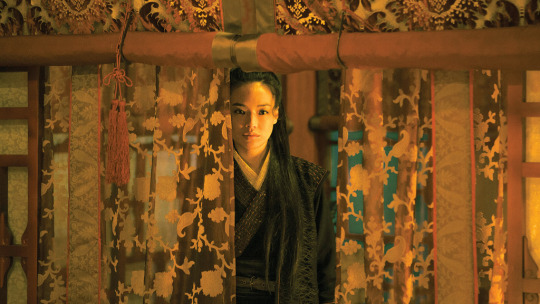
Shu Qi's role of Yinniang is worth mentioning in separate articles and passages. A haunting and mysterious assassin would say only a few words when the film opens. The next time we hear Yinniang talking would be somewhere at the second hour of the run. Her role doesn't presume many expressions, as she lacks emotions. This illustrates the battle inside the protagonist. Many viewers might be alienated by the fact that her face doesn't change often, but there is something magical and enigmatic about her look emphasizing this Oriental drama. Shu Qi is wrapped into the beauty of The Assassin’s costumes, decorations, landscapes, diversity of bright colours and stunning images, yet everything revolves around her, and she is able to be perfect till the very end where she slowly walks away during the ending credits. Perhaps, it was a difficult work for Chang Chen to play his part as he is completely overshadowed by Shu Qi in her most exuberant and memorable role in the cinema so far.

To sum up, The Assassin is a truly Oriental romance many viewers would find dull and slow. From the other hand, for those who enjoy the boundless dimensions of the Oriental world's sophistication and mood, The Assassin would be an unforgettable delight. The film lacks a coherent narrative part, but it is extremely beautiful. It entertains with sublime visual methods of Hou Hsiao-Hsien and kills with the performance of Shu Qi playing this haunting and alluring assassin Yinniang. Once again, Hou decided to rely upon visuality, and this is a challenge the Taiwanese New Wave master accepts. He encounters the world of modern cinema where the film has to come up with moving action and call upon the similar instincts and predilection of the audience raised on the Hollywood rubbish and clips where you can always skip half or even more without losing anything. Hou Hsiao-Hsien keeps making his films against all odds, despite some adjustments. His style remains unique, and the beauty of The Assassin is worth millions of faceless features. The Assassin is another great achievement of his career and one of the best modern Oriental films I have seen.

3 notes
·
View notes
Text
The Best Films of 2018, Part II
Part I is here. Let’s keep it moving. ENDEARING CURIOSITIES WITH BIG FLAWS

103. Zama (Lucretia Martel)- In this movie there's a motif of Zama, an officer of the 18th century Spanish Empire, starting a scene by talking to someone or staring at someone off camera. After a minute or two, the camera cuts to some servant and disorients us. There's a person there, always there, to serve him, and it doesn't really matter who it is. It's a brilliant way to get at the colonialism that the character depends on but is still trapped by. So I get a little bit of what the film is trying to do, but it's boring. I'm an ignorant person who doesn't know how to watch Lucretia Martel's films or have any context for South American history, but I know what boring is. 102. I Feel Pretty (Abby Kohn and Marc Silverstein)- I like that Schumer tried something different instead of falling back on her persona, but there isn't enough new or interesting here for me to recommend--besides National Treasure Michelle Williams, of course. The film nearly displays "Do you see that she's turning her back on her real friends now?" on the screen. 101. A Simple Favor (Paul Feig)- At times cheeky and sexy and juicy, but it still wears out its welcome by twists ninety-one and ninety-two. 100. Double Lover (Francois Ozon)- Diverting until it gets silly, then so silly that it gets diverting again. There are about five too many twists, and I'm still unclear on how seriously the film takes any of those twists. More importantly, I don't think there's much of a takeaway from any of it. Ozon seems to have found a real muse in Marine Vacth though. 99. Borg Vs. McEnroe (Janus Metz Pedersen)- As a Shia Pet, I felt obligated to see his portrayal of Johnny Mac. I didn't learn anything that I didn't already know from this mediocre biopic though. Watch the documentary McEnroe/Borg: Fire & Ice instead. 98. Ralph Breaks the Internet (Rich Moore and Phil Johnston)- There's some clever visualization of the the Internet, such as the way that a link shuttles an avatar off in a transparent car or the way that shady newsboy types whisper about pop-up ads. And I liked a lot of the Disney tie-in stuff that critics are wincing at. As far as textbook screenwriting goes, it's great at that idea of making you think that the protagonists will accomplish their goal very easily, only to have them be re-directed to square one. The voice acting is top-notch. Why do these movies get so plotty though? I felt as if the internal logic started getting inconsistent about halfway through--at the same time that the first one got bogged down with candy stuff instead of 8-bit video game stuff. And if there are so many lovable characters from the first entry, why do we get such tiny servings of them here? The movie's too long already, but what I wouldn't give for an occasional cut back to Fix-It Felix raising some kids.
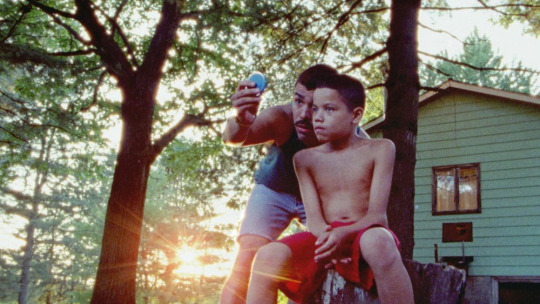
97. We the Animals (Jeremiah Zagar)- The Tree of Life is one of my favorite movies, and on its face, We the Animals is a really similar impressionistic memory. So why do I like it half as much? Are lighting and music that important? Is Jessica Chastain? Is latent racism? All I know is that this felt like a story I had seen before pitched at the same intensity for a running time I was happy to see expire. 96. Kodachrome (Mark Raso)- The three leads are all pretty good. (Ed Harris does this bashful, pulling-on-his-eyelid thing that killed me.) But with mathematical precision, the film matched each element I liked with another thing that infuriated me. Specifically, the whole plot hinges on one scene, and that scene is preposterous and alien to human behavior. 95. Deadpool 2 (David Leitch)- The pacing of these movies is bizarre to me; they're half-over before they really get started. No one else is bothered by the fact that Cable has no motivation or backstory for the first hour? Some of the connections to X-Men felt more forced this time around, but I thought this entry was much funnier than the first, even mixing in some more subtle visual gags. (The exotic locales montage ending in Biloxi really got me.) I have to give credit to the X-Force parachute sequence, which is audacious and unexpected. And clear out for Zazie Beetz, who is a huge star in the making. 94. At Eternity’s Gate (Julian Schnabel)- Something about Van Gogh was essentially unknowable, which is a great reason to make a movie about him and a terrible reason to make a movie about him. I'm not sure that Julian Schnabel got to the bottom of the man any better than anyone else has, though maybe that's an unfair expectation. To his credit, Schnabel yada-yadas the ear business and Van Gogh's death in favor of his more poetic understanding of the artistic life. The movie doesn't coalesce for me, but there's a banger of a scene between Dafoe and Mads Mikkelsen about the responsibility an artist has toward God. That short nested inside makes the whole thing worth seeing. The conversation I had afterwards with one of the two other people in the theater, an art historian, was a solid three stars. 93. Bohemian Rhapsody (Bryan Singer)- Some biographical movies do a good job of compressing time, and their supporting characters don't feel sacrificed or glossed over. For many other mediocre ones though, including this one, I submit the Three Scene Rule. Three scenes is kind of the minimum for a character to register an arc and for an actor to present any kind of dynamic performance, so in a lot of these true story movies, that's all that a supporting character gets. If you're looking for it, it's glaring. (Watch Hidden Figures again with the husband and boyfriend characters in mind. I'll wait.) This movie has a few characters that matter: Freddie Mercury, obvs; the other Queen members; Paul Prenter, the unfairly composited villain; and Mary Austin, the platonic love of Mercury's life. The movie spends way too much time on her, as if to tease the audience with the idea that Freddie might be straight. As for everyone else? Three scenes. Ray Foster, the record executive played by Mike Myers (!): A. "Look, guys, I like formulas. This opera stuff you're talking about? That sounds crazy." B. "The opera stuff is crazy. I ain't making that the single. You can walk out of here for all I care." C. [hangs head in shame after being proven wrong] Jim Hutton, Freddie's partner for the seven years this movie doesn't care about: A. "Look, pal, I may be a waiter, but you can't just grab me like that. On second thought, let's talk. You should learn how to love yourself." B. "Oh, hey. Glad you tracked me down, slugger. You love yourself now? Sure, let's go meet your parents." C. "Guess I'm your boyfriend now. Looking forward to the show." Freddie's Parents: A. "You go out every night! What are you doing out there? Why can't you be a good boy? What's up with your new name?" B. "Why can't you be a good boy? What's up with your new name?" C. "You're a good boy, I guess, even if you're gay. Guess that's your name for real." I like the idea of reproducing the Live Aid performance in full, and the movie comes alive during its musical sequences. But I wish that the same attention given to, like, the number of Pepsi cups on the piano was also given to the nuts and bolts of the storytelling.
92. The Predator (Shane Black)- I get why other people don't like this. The final fourth feels obligatory, and it seems cut to the verge of incoherence. But if you don't get a little tingle out of a game cast saying Shane Black things like, "Predators don't just sit around making hats out of rib cages," then we are very different moviegoers.
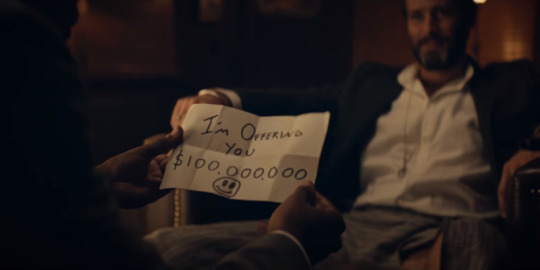
91. Sorry to Bother You (Boots Riley)- I admire Boots Riley's ambition, the way he's taking many of the ideas that drove his music and channeling them into film. But there are too many ideas and, strangely, too much plot to cohere. I liked some of the jokes, especially the Robocop-py TV clips laced throughout. I think my main problem, however, is Lakeith Stanfield as Cassius. He's a fascinating actor, but his energy is completely wrong for an everyman lead like this. I don't think he was the right choice to carry it. 90. Thoroughbreds (Cory Finley)- The repartee at the beginning is sharp, and there are some engaging elements of style. God knows I've never complained about rich, sad, nubile brunettes with strange eyes. But there are pieces missing in that forest-for-the-trees way that happens sometimes with debuts. Like, how do these privileged girls not have access to a gun when our national nightmare is based on all young people having access to guns? Or what is the exact motivation behind the crime at the center? Lots of great characters have been spurred by a violent curiosity, but a zinger here and there doesn't make these girls Raskolnikov. 89. White Boy Rick (Yann DeMange)- Even if this isn't it, I think Yann Demange has a great film in him. There's some urgency to White Boy Rick's politics, and it looks interesting. If nothing else, it succeeds in making the surroundings seem as gloomy as the characters all acknowledge them to be. But this isn't a great film in either of its halves. It's motivated by plot until a crucial event that I don't want to reveal, then it veers much more into character. I would normally sign off on that, but this movie grinds to a halt in the change and never recovers. McConaughey pulls his weight, but Richie Merritt is pretty bad in the lead. 88. The Strangers: Prey at Night (Johannes Roberts)- Despite some striking images and a welcome lack of explanation for the menace, Prey at Night doesn't reach the heights of its predecessor, mostly because the characters are too paint-by-numbers. 87. Ant-Man and the Wasp (Peyton Reed)- Probably the first Marvel movie that would benefit from more action. Some of the material is genuinely funny thanks to Michael Pena and Randall Park, but I got a little drowsy during the middle hour of talk about phase-shifting and the quantum realm. Get back to making things big or making things little, Dr. Molecule! 86. Creed II (Steven Caple Jr.)- The pieces are there, but it's a problem when Jim Lampley, who has one hundred times as many lines as the fifth lead, explains to the audience what they literally saw an hour earlier. If nothing else, this movie proves, through his absence, how good of a director Ryan Coogler is. I would be lying if I said I didn't get the chills at some key moments. Stallone’s performance and Jordan's muscles are good. But there was a dark, honest way for this movie to end, and it went directly against that ending into something more Hollywood. 85. Let the Sunshine In (Claire Denis)- Like Taxi Driver if Travis Bickle just wanted the guy to get him a glass of water afterwards. The film does have that kind of myopic focus--the sexy, ever-candid Binoche is in every scene--but it's far more elliptical, progressing only through character, never through plot. Let the Sunshine In is unique in a way that is different from Denis's other unique works: No one talks like an actual person, and she acts as if you should know all of the characters instead of properly introducing them. It's not supposed to be funny ha-ha, so excuse me if that's what I wanted.
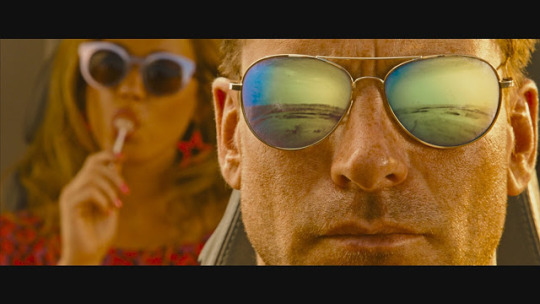
84. Revenge (Coralie Fargeat)- like the style of this film, the color palette, the synth score, how far it's willing to go with the gore. But if it's called Revenge, and it's clear who the hero is (hint: not the rapist), then the whole thing feels like a fait accompli. We know exactly who's going to be the last woman standing, and we even know the order of the people she's going to kill.
PRETTY GOOD MOVIES 83. The Rider (Chloe Zhao)- This movie is trying to be a poem, but the parts I like the most are prose. It's a promising piece of filmmaking with heartbreaking moments, but I found it most effective when the storytelling spelled things out. It's an all-hands-on-deck independent film, so the amateurism of the piece shines through in the performances from non-professional actors. The relationship between Brady and his autistic sister is interesting because she speaks with that sarcastic cadence that can be learned from only children's programming. It's unlike what we usually see because, you know, she's a non-professional actor and real autistic person. So what do I know? 82. Unfriended: Dark Web (Stephen Susco)- Pretty tight from a storytelling standpoint and definitely grisly enough to get under the skin. But these laptop flicks move with such alacrity that it's hard to believe them whenever they ask you to buy something like love, since they paint it with the broadest strokes imaginable. Not that I would want a two-hour version of this anyway. 81. Juliet, Naked (Jesse Peretz)- Charming enough, arriving at a more realistic place than I expected, Juliet, Naked does nothing to make me revoke my charter membership in the Rose Byrne fan club. What an odd shape this film has though. The inciting incident happens at the hour mark, and it races obligatorily to an ending at an hour, thirty-seven. 80. Ocean’s Eight (Gary Ross)- It sets its marks and hits them adequately, with most of the charm that made the other Ocean movies fun. But there's something lifeless about Ocean's 8, both in the direction and the score. Take, for example, Richard Armitage's bland, sort of lost performance as an old flame/mark. It's such a nothing part that I began to think that it was a thesis: The men are just chess pieces, and they shouldn't take attention away from the women this time. But then James Corden emerges in the last half-hour and shines. So maybe Armitage was just bad and directed poorly? This movie exists for the Movie Star interplay though, and it delivers on that level. Cate Blanchett was good for so long that she's popular, and Sandra Bullock was popular for so long that she's good. Rihanna has to dress like a janitor at one point as a disguise, and she proves how absurd it would be for her to ever blend in. Anne Hathaway is the funniest of the bunch, balancing on a highwire of how big she's supposed to seem. Helena Bonham Carter gets the "and" hammer for all my credit fetishists. 79. Mary Poppins Returns (Rob Marshall)- I saw this on Christmas night with my family. The original Mary Poppins was the first movie my mom ever saw in theaters, and it's probably my wife's favorite. To the extent that insulting it is kind of insulting an important part of who she is. So I couldn't be the guy coming out of the theater like, "The Bankses definitely deserved to lose their house." Between you and me though, it's just fine. Entire sequences could be cut without damaging anything--do we ever come back to the bowl that Meryl Steep is supposed to be mending?--and most of the conflict feels manufactured. These legasequels always end up feeling like boxes being checked. We all know that the guys with the cannon had to come back, right? But some of the numbers are so joyful or stirring that even this grinch snuck a few smiles at his daughter as she pointed to the screen and said, "That's so silly." It's a good movie to see on Christmas night with your whole family. 78. RBG (Betsy West, Julie Cohen)- This movie is designed to make the viewer who would seek it out go, "What an American hero." It does that, I suppose, and there isn't a whole lot wrong with it. Yes, she is a very impressive person. But the film has too much untapped potential and too few teeth to recommend beyond that rubric of achieving its goals. For example, what about half of the population that would sneer at the notion that Ruth Bader Ginsburg is an American hero? Besides the inclusion of some radio clips over the credits, the filmmakers aren't concerned. "Look, she was friends with a conservative!"

77. Searching (Aneesh Shaganty)- Since I've seen thousands of movies that don't take place inside of a computer, there's still some novelty to the handful that do. On one hand, there are four or five twists too many, and the film isn't consistent with its own rules. On the other hand, it gets intriguingly dark for PG-13, and it never stops moving. 76. Uncle Drew (Charles Stone III)- The attitude toward women is retrograde, and to call the plot cookie-cutter would be an understatement. But this works, mostly because of the sunny, natural performances. Kyrie Irving, whose handles are even more of a marvel on a forty-foot screen, has to act through pounds of makeup, but he pulls it off. With only commercials to his name, he has to carry scenes of, like, standing at someone's grave and apologizing, and he has the presence and confidence to do it. I also should mention that Nick Kroll has a nothing-to-lose, galaxy brain performance for which probably zero of the lines were written ahead of time. "Shout-out to Oberto, shout-out to Aleve, the number one pain reliever in the game right now." I have to extend some of the credit here to Charles Stone III, who has made a calling card out of coaxing performances from newcomers. 75. Christopher Robin (Marc Forster)- Cute. 74. Unsane (Steven Soderbergh)- What seems to be a B-movie hitting its marks gets elevated by one fantastic scene that makes it seem timely and vital. I can't help but think Steven Soderbergh is punching below his weigh class though. I'm glad that an experiment like shooting a movie with an iPhone gets him up in the morning, and I know he doesn't want to make another Traffic or Out of Sight. But maybe, here's an idea, audiences might? 73. 22 July (Paul Greengrass)- The first thirty minutes are harrowing, in part because of their disciplined cross-cutting and Anders Danielsen Lie's chilling stoicism. The mistake that Greengrass makes is thinking that, later on, the three strands of story are equal in importance. He cuts away from the court case at its apex to see a kid trying to walk again or a prime minister demanding that his administration get tougher. Some moments are powerful, and Greengrass's composition and editing have mercifully softened, but this becomes a grind at a certain point. 72. Solo: A Star Wars Story (Ron Howard)- I hate to state the obvious, but this feels like multiple movies stitched together because that's exactly what it is. On one hand, we have the foggy opening, featuring an airtight inciting incident and setting up Emilia Clarke as that rarest of things in a Star Wars movie: a character with unclear motivations. But as the film goes on, it reveals why Han doesn't work as a protagonist. (Ehrenreich is bad, but the storytelling sinks the movie more than his performance does.) Everyone else in the movie drips with charisma and comments on the action while Han is left to connect the dots. In other words, the other characters get to be Han Solo, and Han Solo doesn't. By the time we get to the marauders, past the two hour mark of a movie that shouldn't have been more than two hours, the narrative crumbles under its own weight. These movies are way too competent to fail--I can list five or six moments that transcend the flaws--but each of these origin stories has a way of erasing the myth of Star Wars with a pen. 71. Bird Box (Susanne Bier)- This is a genre film that you've seen before in one way or another, so your expectations (and filmgoing experience even?) will dictate what you think of it. There's a metaphorical reading available, but that doesn't make the picture more artful automatically. Trevante Rhodes is a Movie Star. Here's what I can tell you: We need to appreciate John Gavin Malkovich while we can. Delivering the apotheosis of the selfish dickhead survivor character, he a) asks why the group can't stay in the grocery store forever, b) points shotguns at people when they try to let in strangers, c) drinks as he's telling people matter-of-factly that this is the end of the world, and d) (sort of) explains why he is the way he is. And-he-does-it-all-with-the-deliberate-cadence-that-you-are-doing-in-your-HEAD-right-NOW. I'm not saying the guy should win Best Supporting Actor or anything, but I admire his career more than any that would get a Best Supporting Actor.
2 notes
·
View notes
Text
'Godless' writer/director Scott Frank talks 10 of the most stunning shots
Our critic Ken Tucker said it: Godless will make you believe in Westerns again. The Netflix limited series was 15 years in the making for writer/director Scott Frank, who — spoiler alert — builds the story to an epic shootout between a gang of outlaws and the women of La Belle, a showdown between the ruthless Frank Griffin (Jeff Daniels) and the redeemed Roy Goode (Jack O’Connell), and Roy’s solo journey to California to reunite with his brother. Along the way, there are shots so gorgeous, Godless may be the most beautiful TV series of the year. Here are the stories behind 10 of our favorite moments.
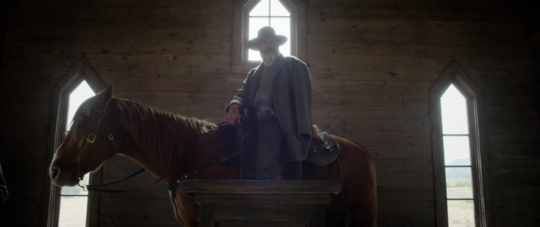
Frank (Jeff Daniels) delivers his own sermon (Photo: Netflix)
Episode 1: Frank preaches on horseback.
“The challenge is the horse has to hit a mark,” Scott Frank says of Griffin’s perfectly-framed warning to a church congregation not to hide Roy should he take refuge in their town. “The other trick is he has to duck and be able to not hit his head as he’s riding into the church, and that’s the actual doorway — we didn’t change anything into the structure. He rode in, and it’s full of people, and there’s a narrow path, and they just kept practicing with the horse. Because the platform he’s standing on is only so big, the horse wouldn’t overshoot the mark or it would be stepping off the platform. The platform was designed to stop the horse from going any further.”
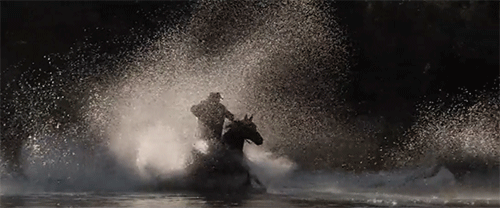
Griffin’s gang makes a splash (Photo: Netflix)
Episode 1: Frank’s gang crosses the Rio Grande.
“We would scout locations and we knew where the sun would be. There are times where we would have to wait for the exact moment. When they’re crossing the Rio Grande and the sun is behind the water when they’re splashing — we knew we had an hour. It was 10:15, and we had to start shooting, and we would only get two or three takes before the sun would move and we’d lose the perfect light,” Frank says. “The other thing there is the depth of the river. The river changes depth depending on how much water they release upstream. So again, it had to be carefully planned so that it wasn’t too deep. The stunt coordinator and the wranglers all rode it before to make sure that the bottom of the river was okay.” Then it was the actors’ turn. “They were all proud of themselves that day,” Frank says.
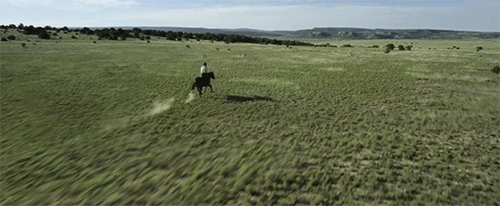
Roy (Jack O’Connell) rides again (Photo: Netflix)
Episode 3: Roy rides out of the ring.
“You want to see this man who feels the most alive and the most free when he’s on horseback — the whole idea is, you don’t know if he’s gonna come back,” Frank says. Three shots make the sequence after Roy breaks a horse for Alice Fletcher (Michelle Dockery): The first is when her son, Truckee (Samuel Marty), opens the gate of the corral. “We’re on the ground as the horse bolts past us. Jack was aboard without any tack — he’s riding without a saddle or bridle or anything, he’s just holding on to the mane, and he’s at a pretty good clip. So we built a temporary corral out of metal fence right outside, so the horse would have to stop,” Frank says. “And on one of the takes the horse tried to wipe Jack off his back on the fence. Jack saw it coming and just bailed. He took a good fall there.”
For the next shot, chasing after the horse, they used an electric vehicle called a TOMCAR. “It goes about 40 miles an hour, and it has a 30-foot arm on it with a stabilized head for the camera, to keep the camera still, and you can move the arm up or down,” Frank says. “It holds four people, so you have your camera operator, the cinematographer, the driver — everybody can be in the car, and the camera’s pretty low to the ground, and we’re pretty close to the horse.”
For the third, soaring shot, they used a drone. “Sometimes it’s windy in New Mexico, and this was July and there’s a lot of storms, and it was very hard to control the camera the first time we did it, so we had to go back and shoot it again,” Frank says. “We mapped it out. We knew the exact route — how far he was gonna ride, where he was gonna start to turn back. You’re not only mapping out the path of the horse, you’re also mapping out the path of the drone and the angle. The camera sort of tilts up as he rides away from us, which is what makes it feel like off he goes. So you go from the ground where we’re tracking him, and then above him, when he’s a tiny little figure below racing across the ground. And then we let him go, and at the top of frame he does a hook and starts to come back, and finally he exits the frame. It’s a lot of work, but also, the music there is spectacular. It’s a big music cue.”
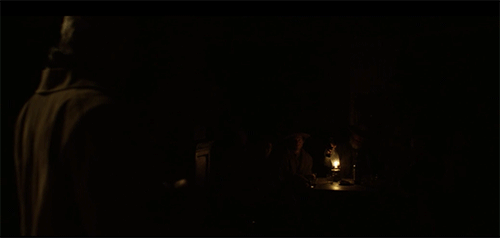
Frank illuminates his gang (Photo: Netflix)
Episode 3: Frank surprises Marshal John Cook (Sam Waterston).
There’s “a little, teeny bit of extra light” added to the shot when Griffin places the glass chimney on the lantern and he and his gang, lying in wait for the Marshal, suddenly come into view in the dark saloon, Frank says. But for the most part, that entire sequence is practical: “We knew we wanted the rest of the saloon to fall away into blackness, so that when he walks in, he doesn’t see anybody [but the bartender],” Frank says. “We went into the location and covered all the windows during the day and we kept testing different lenses on the lanterns, so that when you lower the chimney it does light up the room all around. That’s not an effect. We shot in there without any light. You can do that with digital.”
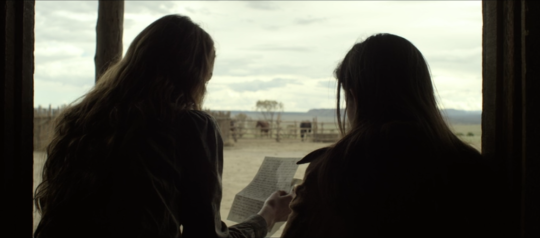
Alice (Michelle Dockery) and Truckee (Samuel Marty) sit in the doorway of their home (Photo: Netflix)
Episode 6: Alice reads the letter from Roy’s brother.
“We built that ranch and we built that house, and this was one of the main shots we were thinking about. I think about The Searchers or other great Westerns having the camera in the dark house looking out the door — it’s a classic shot. So we wanted to make sure that we had the horses and then the mountains beyond,” Frank says. “I always knew that for the big dramatic moments we would be shooting out that door. The bulk of the letter reads on her back, actually, because it’s so powerful with just the two of them sitting there.”

Griffin’s gang is coming (Photo: Netflix)
Episode 7: Frank’s gang rides to La Belle, and the dust flies.
“There’s no tricks in that — that’s 40 men on horseback strung out across the frame. The riders are all pros, so getting them spaced out is the easy part. The hard part is the timing — the time of day is really perfect for it, so you just wait for that — and knowing how far away from the men to be to get the exact background,” Frank says. “It was just picking the right spot. For a while they were saying, ‘It would be so much cheaper if we didn’t go back to the actual ranch’ — because they’re really riding by when [Alice] sees them. That ranch we picked because it was such a beautiful location. Everywhere else wasn’t as good, so I just keep saying, ‘It has to be where it actually is, because we picked it for that vista.'”
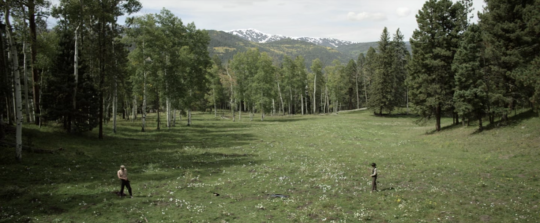
Frank and Roy prepare to draw (Photo: Netflix)
Episode 7: Frank and Roy meet in the meadow.
“Nobody wanted me to shoot there, because you couldn’t drive trucks into that location or you’d ruin the meadow — you had to park some distance away and take these little four-wheel-drive Gators into the location,” Frank says of the spot two hours outside Santa Fe. “It was really tricky to get the big crane in for that huge shot — that big, classic, corny shot of the two of them facing each other down in the meadow with all the white flowers and all the white snow on the mountains in the background. But once I saw the location, I couldn’t un-see it. So they were very upset with the production designer for showing it to me, I think.”

Roy gives his horse a rest (Photo: Netflix)
Episode 7: Roy heads West.
“We could’ve had a half-hour sequence of him riding to California,” Frank says. And we would have watched it. He credits second unit director Jeff Dashnaw, a veteran of many Westerns (The Magnificent Seven, The Hateful Eight, Django Unchained), with delivering most of the montage — including the sunset shot when Roy dismounts his horse to walk ahead of it for a stretch. “That is a spectacular shot, which they got at the end of one day. They showed me and I just knew. I actually gave that image as a gift to Jeff’s son J.J., who was riding the horse for that,” Frank says.
The series was filmed over five months. “Jeff and I were always on the make for locations and he was always showing me pictures. Or when we’re scouting other locations, even if we didn’t use them for a scene, we might say, ‘You know what? This’ll be good for the trip to California.’ We’d remember them for later — sometimes we’d shoot them four months later,” he says.
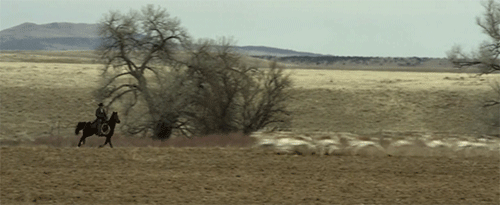
The antelope play (Photo: Netflix)
He remembers scouting for the flashback scene in episode 5, when Frank teaches young Roy how to lay down a horse and they almost get hanged. “It’s a working ranch, and there was a herd of antelope there, and so I said, ‘Let’s bring the second unit crew out and get a shot of Roy riding through the antelope as part of the California montage.'”
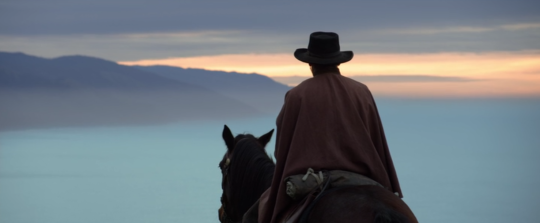
Roy sees the ocean for the first time (Photo: Netflix)
The first unit took over once Roy reached California. The final shot of the series finds Roy looking out at the ocean. It was another location, difficult to access with cranes, that Frank fought for. “We’d been looking forever and they kept sending me pictures. I always wanted to shoot in Big Sur, and they kept sending me pictures of different places, like in Santa Barbara and Morro Bay, and they were all much easier to get to but they didn’t have the same look. I knew I wanted it to be up high with raw coast in either direction. You had to come out of the mountains and come out of the Redwoods. Nothing looked right. He couldn’t be down low or it wouldn’t be very dramatic,” he says.
The crew was on the plane on a Sunday when they heard fog was expected Monday, when they were scheduled to shoot. “Everybody just looked at each other and we said, ‘Let’s go. Let’s just shoot today.'” In the end, they couldn’t get O’Connell ready in time with the aging makeup and beard, but they were able to rehearse the shot with the crane and with the double. “It was enormously complicated: he rides up and the camera comes around from the front of him and goes past him,” Frank says. “The next morning, we could shoot it right away because we had done it 15 times the day before. We got it before all the weather hit.”
Godless is streaming now on Netflix.
yahoo
Read more from Yahoo Entertainment:
How ‘Godless’ pulled off that epic finale shootout
Review: ‘Godless’ will make you believe in westerns again
6 things to know about ‘Godless,’ Netflix’s star-packed limited-series western
#michelle dockery#_uuid:31123ca7-7a84-3364-b7cb-50306e656bfd#_revsp:wp.yahoo.tv.us#jack oconnell#jeff daniels#_author:Mandi Bierly#scott frank#godless#netflix#_category:yct:001000086#_lmsid:a0Vd000000AE7lXEAT#interviews
10 notes
·
View notes
Text
3 Fan-Made Music Videos About Brideshead Revisited and Maurice And How To Mute Them And Pair Them With Songs From The Shins’ Excellent New Album, Heartworms
First, a word on my methods. I have been prompted to embark on studies of this medium--that is, the medium of the fanmade music video about gay lovers from a piece of fiction that may or may not name them as gay--by the dearth of adequate visual representation of homosexuals in media. For a while this was a popular folk art form in America and worldwide. While most videos were about popular TV shows, teens learned video editing skills and then trained their attention on niche interests as well. There are no videos for “Y Tu Mama Tambien” (I’ve checked), but whiter, nerdier gay classics like Brideshead and Maurice have received the AMV treatment. Once in a while I like to regress, and during these times I watch these videos. I appreciate all the people who make these videos for me to consume. Sadly, the popularity of the art form has declined as other video art forms like snapchat and vine have encouraged youth to innovate in new ways. This has led to most of the videos still online for any given fandom (and there are almost always some for almost every fandom) being set to songs which are years out of date. You can remedy this in the comfort of your living room with no technical skills required at all. All you have to do is open a new tab and play a song you like which matches the video sort of. This article is intended to highlight my favorite songs from the new album which indie rock band The Shins has just put out, but you can play any Britney song from before 2005 and it will work just as well for all of these videos.
Without further ado, here’s the shit that’s keeping me up at night still to this day because this is how I engage with my own emotions rather than seeking a therapist or something:
1. Maurice/Alec- Keep Holding On - https://www.youtube.com/watch?v=IQIOu2RmEm0 --pair with “So Now What?”
This video is a classic, posted on Youtube in the brighter year of 2008. Its low-res quality doesn’t impede the seriously artistic way this four-minute long video is put together. Part of the credit goes to the brilliant cinematographers working on the actual movie, but Youtube user perrythaler has a great sense of how to choose clips which convey the narrative arc of Alec and Maurice’s love while punctuating the flow with shots of them embracing, sharing glances while playing cricket, and (most wrenchingly) Maurice undergoing hypnosis. The video also mixes in a lot of variety between dark blues and bright outdoor summer scenes, so it stays interesting. The song isn’t one that currently strikes me as emotionally resonant, but that’s why God gave us mute buttons and allowed us to open new tabs. Like a fine wine, you can pair this video with any music which matches its joyous, nostalgic, hopeful ambiance. For this, I recommend “So Now What.” Mercer’s vocals are floaty and dreamy. Featured lyrics: “I had this crazy idea/that we’d just coast to the end/change lines in every direction/guess we’ll just begin again.” The words to the song really are, you realize, about Alec and Maurice suddenly realizing they are willing to take risks for one another and give up literally everything stable in their respective lives in order to achieve intimacy which transcends class distinctions and which flies in the face of homophobia and, hopefully, avoids the brutality of the oncoming first world war.
2. Brideshead Revisited- With All Of My Heart - https://www.youtube.com/watch?v=ulEHogq4Xwo --pair with song of your choosing but “cherry hearts” works well for the first half
I highly recommend watching the actual video with sound, but you will also want to mute it and use it with other songs, because this is, sadly, one of the very few Brideshead videos out there. It is four glorious minutes long and tracks the happy-to-tragic trajectory of the overall story. There are shots of Charles and Sebastian dancing, laying arm in arm, etc. The later parts of the video are about Sebastian’s alcoholism and Charles falling out of love with him.If you have a song about being in love or longing, mute it and play from the beginning. If your song is about tragedy and grief, start somewhere about two minutes in. “Cherry Hearts” fits with the beginning pretty well, and the lyrics are just so so in line with Brideshead that it prompted me to start on this whole spiral.
You're not wanting anybody wanting you I get it, all is fair But I've been biting all my cherry hearts in two You don't even care Won't you ever come down from the big rock I found you climbing Stowing your diamonds away [Chorus] You kissed me once When we were drunk It left me spinning on my heels Called the devil for a deal You kissed me once When we were drunk My head went rolling on the floor Past the window, out the door
Cut to me crying!!
3. Shattered- Maurice and Clive -https://www.youtube.com/watch?v=uTOJ11iF4d8-- pair with “Heartworms”
I have one complaint for this video, which has to do with the multicolor filters that seemed to the creator to be a good idea and which were indeed very fashionable for AMVs created between 2011-2013. Everything else about this video (when it is muted, anyway, and paired with a really good song) is perfect. It’s heart-wrenchingly organized in almost reverse chronological order, starting out with the scene where Maurice tries to rekindle the physical affection he and Clive had always shared and is brutally rejected by his sweetheart. Maurice starts to cry, and the rest of the video is a montage of the past and then of the scenes where Maurice visits Clive at his country estate after he is married, when Maurice is still mooning over him and has not met Alec yet. I think the original song the creator chose is probably okay, but I won’t ever know because I am only listening to “Heartworms” over this video, over and over again. “Heartworms” is a song about being rejected and not being able to get over it and feeling like while maybe part of it is about homophobia or pain or something personal it might also kind of be about class (which with Maurice and Clive it almost certainly is, since Clive really is from the gentry whereas Maurice is just a middle-class workaday stiff, especially after dropping out). It’s half bitter and half loving, and this video paired with the song captures that sense really well.
There we have it, folks, my midnight infodump! This is what I found myself obsessing over on emotional late nights in the years after I got done caring about Harry Potter. That said, though, if you are ever interested in which Remus Lupin AMVs are good enough to pair up with your favorite mountain goats song, give me a call.
12 notes
·
View notes